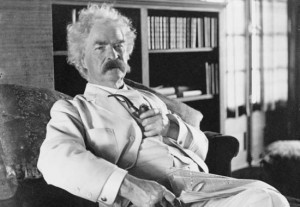Ignorance and Tolerance, Never Shall the Twain Meet
An expression only has meaning within the stream of life.
I only took two English classes in college—ENG101, and business communications (I did MBA, not MFA)—and that quote was the favorite of my 101 teacher. He was a thin, hippy-type guy, bald on top with a long ponytail, an exuberant man with flapping arms who made it dead clear that he was willing to consider GPA bumps for sexual favors. Creepy. Probably unemployed by now. He repeated that phrase so often that it's stuck in my head some fifteen years later.
An expression only has meaning within the stream of life.
Simple, but true. Words have power and meaning, but only in context. Words without context are dictionary filler.
That, I submit, is the core reason why the plan to revise Twain's Huckleberry Finn is so ridiculous. No, not ridiculous: dangerous and stupid.
New South Books, an Alabama-based publisher whose charter is to reflect the culture and history of the Southern US, made the announcement this week that they plan in releasing a revised version of Twain's book, replacing two "hateful epithets" with softer words. They cited the support of a "Twain scholar" for added justification, and stated the purpose of the removal was to "…counter the 'preemptive censorship' that [Twain scholar] Dr. Gribben observes has caused these important works of literature to fall off curriculum lists nationwide."
So, the stated goal is to appease those who would censor literature by (wait for it) censoring literature.
An expression only has meaning within the stream of life.
The words in question are "injun" and "nigger" (as in Nigger Jim, one of the main characters of the book). Hateful words? Yep. Outdated epithets of ignorance? You betcha. Do they have context within the story Twain set out to tell? Absolutely. Does it change the story to replace them with nicer words? Yes.
Those words shock. Even typing them into this post somehow feels wrong. I'll type "fuck" all day long, but to type those words just feels dirty, especially the latter. With all of the discussion on them, I've not seen a single person actually spell it out. And that's the point, today even more so than when Twain wrote it.

The most under-rated moustache grower of the past century.
It's been a long time since I read the book, but here's my read on it. Huck befriended Jim, a runaway slave, and traveled with him on a raft. He seemed pretty oblivious to Jim's official status as a sub-human servant (by the standards of the townsfolk and society-at-large). Huck befriended Jim because he liked him as a human, not caring about his "official" status; but, at the same time, he called him by his "epithet" name and treated him like a lesser person, because that was what society trained him to do—treat blacks like animals. Hence the importance of the word: through Huck's innocent eyes, Jim was a person, but society's biases had already tinted how he saw/treated blacks/indians. It reminds us of the dangers of poisoning the well of youthful innocence and compassion with hate.
Here's the end-game: the revised book gets ignored by most of the world as a misguided revisionist work; at the same time, conservative school systems and municipal libraries adopt it as the "accepted" version of Twain's classic. Children in Kentucky, Texas, Alabama, etc are only given access to the revised version, and aren't even aware that there is a "real" version until they are older, if ever. Other publishers catch on and offer whitewashed versions of other oft-banned books. Big Brother becomes the good guy in the War on Terror™, Heather's two mommies are platonic friends, and non-revised books are burned for the good of the children in a non-ironic way in Fahrenheit 451.
Twain's works are in the public domain, and New South are well within their rights to do this. Which is fine. In a perfect world, nobody would take this seriously; but we know that's not the case. We live in a country where the textbooks are being revised to have a strong theist slant based on the biases of one large state, and libraries still ban books becasue they think that certain words, if read by youngsters, will be damaging. They forget that
An expression only has meaning within the stream of life.
Life has ugly in it, and pretending otherwise doesn't make it go away. Understanding the ugly and discussing it openly does, eventually. Words are not the problem. Making them into something they are not is.



